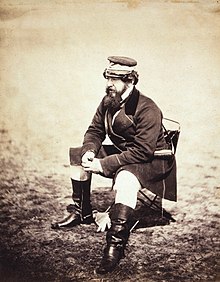William Howard Russell
William Howard Russell (born March 28, 1821 in Lilyvale , County Dublin , † February 11, 1907 ) was an Irish journalist , known for his reports from the war zones of his time. Russell is considered the first modern war correspondent and front-line reporter.
Life
Russell was born in Lilyvale, County Dublin. He studied at Trinity College in Dublin and briefly at Cambridge University . Russell worked as a journalist in Ireland from 1841 for the London newspaper The Times . The longtime (1841 to 1877) editor of the Times, John Thadeus Delane, brought him to London in 1843.
His first assignment as a war correspondent was in July 1850. He reported on the Battle of Idstedt during the Schleswig-Holstein War .
Crimean War
When the outbreak of the Crimean War was imminent in February 1854 , Delane obtained from the Commander-in-Chief of the British Army , Henry Hardinge, 1st Viscount Hardinge , that a journalist could accompany the troops that were being transferred to Malta .
After Britain entered the war, he became a special correspondent in the Crimea. For European newspaper readers, the Crimean War was the first war that they could experience directly from home thanks to new technologies such as the telegraph and photography . Russell made use of the fast messaging system, although he never got used to the telegraph and, because of the high cost, transmitted few words about it. The British Army was reluctant to see the presence of war correspondents. Russell was known for his views - including on incompetence of the army command and inadequate supply of soldiers - openly to portray a wide audience. His reports caused quite a stir in the British public, especially the article " The charge of the light brigade " about a loss-making attack at Balaklava . Immediately, Russell's reports from the Crimea led to severe criticism of Prime Minister Aberdeen's government .
A motion by Liberal MP John Arthur Roebuck to set up a commission of inquiry was accepted in the House of Commons with 305 votes to 148, but Aberdeen's government was overthrown. His proposal to honor not only officers but also common soldiers for bravery was accepted by the House of Commons. Parliament asked Queen Victoria to introduce a new order on December 19, 1854. This happened in the form of the Victoria Cross .
A later consequence of his articles was the introduction of military censorship by Commander-in-Chief William John Codrington on February 25, 1856.
More trips

In 1856 he reported on the coronation of the new Tsar Alexander II in Moscow . The following year he was sent to India , where in 1858 he witnessed the months-long siege of Lucknow during the Sepoy uprising . Washington, DC was his next stop in 1861, where he covered the American Civil War until April 1862 .
During a trip through the southern states, he visited the President of the Confederation , Jefferson Davis , in Montgomery, Alabama . His reports have often been the subject of sharp criticism in the press in both American states. In the south because of his rejection of slavery , in the north because he thought reunification was out of the question. He returned to England in 1863 , and in 1866 his next assignment was in the German War .
In the elections to the House of Commons in 1869 he ran unsuccessfully as a conservative candidate for the seat of Chelsea .
He finally published his experiences in India , during the American Civil War and the Franco-Prussian War . His descriptions of the burning Paris during the rule of the Commune were considered a great journalistic success. In South Africa in 1879 he reported on the Zulu War .
In 1895 he was raised to the nobility. Russell was married twice. A memorial at London's St Paul's Cathedral commemorates him.
Quotes
- “He moves like one with blood on his hands”, said of a leading British politician during the Crimean War.
Individual evidence
- ↑ Michael Haller : Write everything or keep your mouth shut? William Howard Russell, the first frontline reporter. In: Die Zeit, No. 11 of March 8, 1991, pp. 45-46.
- ↑ Royle, Trevor: War report. The war correspondent's view of battle from the Crimea to the Falklands, Edinburgh 1987, p. 19. ISBN 1-85158-064-6
Works
- William Howard Russell: My Seven Wars . Eichborn Verlag, Die Other Bibliothek series , ISBN 3-8218-4186-9
Web links
- Literature by and about William Howard Russell in the catalog of the German National Library
- Works by and about William Howard Russell at Open Library
| personal data | |
|---|---|
| SURNAME | Russell, William Howard |
| BRIEF DESCRIPTION | Irish journalist |
| DATE OF BIRTH | March 28, 1821 |
| PLACE OF BIRTH | Lilyvale , County Dublin |
| DATE OF DEATH | February 11, 1907 |
